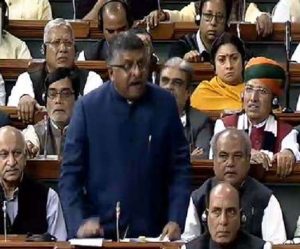The Lok Sabha on Thursday passed the instant triple talaq bill that criminalises the practice and awards three years imprisonment to the husband. The bill was passed after the intense debate as the House rejected a string of amendments proposed by Asaduddin Owaisi, Congress and BJD.
Union Law Minister Ravi Shankar Prasad who had tabled the Muslim Women (Protection of Rights on Marriage) Bill called it a “historic day.” Telling that the bill should not be seen through the prism of vote-bank, but from the humanitarian side, Prasad said the bill was “not about religion but about justice and respect for women.” He said that the bill was essential for gender equality and dignity.
“This bill is a historic step towards ensuring dignity for Muslim women. I thank all fellow Parliamentarians who have supported this bill, which will bring a new era of hope and respect in the lives of Muslim women,” BJP Chief Amit Shah said on Twitter. Union Home Minister Rajnath Singh expressed confidence that the bill would be passed in Rajya Sabha as well. Gujarat Chief Minister Vijay Rupani said that the passage of the bill is a “giant step that will empower women.”
“It is a progressive bill, all parties support it. But there are certain reservations, wanted certain amendments, that is why we insisted it should be should be referred to the Standing Committee but they were in a hurry to pass the bill. Our party will take further steps in Rajya Sabha, will discuss with RS members, will find out a way to reduce the suspicion created by the government,” Congress leader Mallikarjun Kharge said.
After the Lok Sabha passed the ‘triple talaq’ Bill on Thursday, the Narendra Modi government indicated it would be amenable to incorporating some of the amendments that the Opposition suggested when the Bill comes up for discussion in the Rajya Sabha. The government doesn’t have a majority in the Rajya Sabha, and a combined Opposition can force the Bill be sent to a House Select Committee for further study.
The Muslim Women (Protection of Rights on Marriage) Bill, 2017, which prohibits divorce by pronouncing instant talaq, or talaq-e-biddat, was passed with most of the leading parties in the Opposition, including the Congress, voting in favour of the Bill, but with caveats.
The Bill allows the victim to approach a magistrate to seek “subsistence allowance” for herself and minor children. All kinds of instant triple talaq – spoken, in writing or by electronic means, such email, text message or WhatsApp – would be illegal and void.
Initiating the discussion on Thursday afternoon, Law Minister Ravi Shankar Prasad said the Bill will ensure gender justice and equality and termed it “historic”. He said the government has brought in the Bill on the suggestion of the Supreme Court, which had banned instant triple talaq in August.
Rejecting the protest by Opposition benches and the criticism of its provisions, Prasad said it was a “historic day”, as he also asked if opposing members are with “hapless Muslim daughters and sisters”.
Claiming that the proposed law, the Muslim Women (Protection of Rights on Marriage) Bill, is “not about any religion or community”, the law minister insisted that the practice of instant triple talaq has continued despite the Supreme Court order terming it void.
“Even today such an incident took place in Rampur, Uttar Pradesh,” he informed, adding that the law is about justice and respect for women.
Countering the arguments put forward by dissenting members belonging to RJD, AIMIM, BJD and All India Muslim League, Prasad said, Parliament has to decide whether the victims of triple talaq have fundamental rights or not.
The proposed law would only be applicable on instant triple talaq or ‘talaq-e-biddat’ and give power to the victim to approach a magistrate seeking “subsistence allowance” for herself and her minor children.
The woman can also seek the custody of her minor children from the magistrate who will take a final call on the issue.
Under the law, instant triple talaq in any form — spoken, in writing or by electronic means such as email, SMS and WhatsApp — would be illegal and void.
According to the proposed law which would be applicable to the entire country except Jammu and Kashmir, giving instant talaq would attract a jail term of three years and a fine. It would be a non-bailable offence.


















